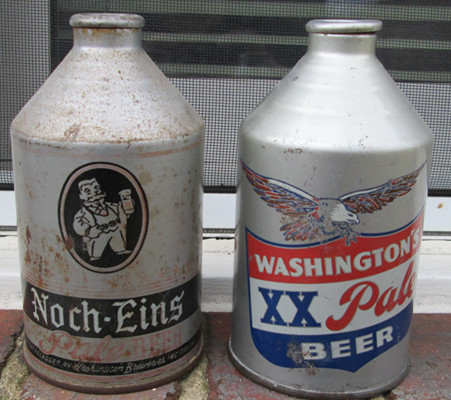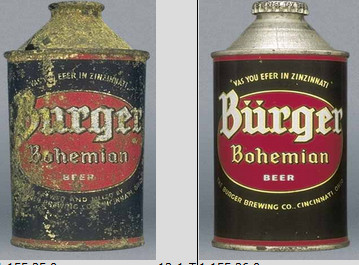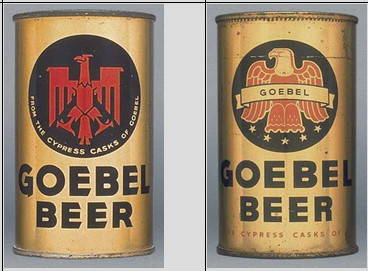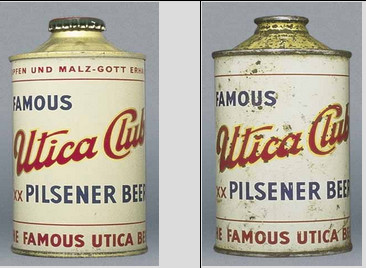Noch Eins and Washington's Pale Lager
(circa 1941)
 |
The anti-German panic in the US during the First World War was not repeated during the Second World War. Sauerkraut did not become "Liberty Cabbage" and dachshunds did not become "Liberty Dogs", but several brewers played it safe and "de-Germanized" some of their brands and label designs. This may be the most extreme example. In 1941 or so, the Washington Brewing Company (1933-1953) in Columbus, Ohio replaced their Noch-Eins Pale Beer with Washington XX Pale Beer. The little German burgermester was replaced by a big American eagle.
There was other examples. The photos here are from the BCCA's beer can guide.
The umlauts on the Burger Beer cone from Cincinnati disappeared. (the cans seem to be in reverse order here). The "Vas you efer in Zinzinnati" slogan remained however.
 |
Goebel of Detroit Michigan replaced their Germanic Eagle with an American one.
 |
Utica Club of New York got rid of its German motto along the top.
 |
Some Germans in the US were interned, as were some Italians, although nothing like the treatment given to Japanese-Americans. German-owned businesses might be taken over by the US government, such as the Harvard Brewery (no connection to the university.) But, unlike in WWI, the more extreme Germanphobia did not appear to any great degree. For example, in 1917-1918 many musicians in the US stopped playing music by German composers. In contrast, the US used the "da-da-da-dumm" from Beethoven's Fifth in official and unofficial propaganda. The "three shorts and a long" was also the letter "V" in Morse Code, and so the familiar short sequence of musical notes became a popular theme.
The cans shown this month then, were a little bit of an outlier. It was an understandable precaution given the history of 1917-1918. Prohibitionist used the fact that German dominated the US brewing industry in the early twentieth century to good effect. The anti-German hatred played an important role in the attempts to ban beer along with harder, distilled liquor with the 18th Amendment (ratified 1919, in effect 1920-1933). When WWII began, American Prohibition had been over for only a few years, and the Dry's were still active and trying to re-establish the ban on alcohol. And, as in 1917-1918 they portrayed their campaign as patriotic and necessary for the war effort. Given the context, the desire of some brewers to de-emphasize their German ties was not surprising.
Fortunately, the Prohibitionist's efforts did not pay off. There were restrictions on brewers. Beer cans were reserved for military use until 1947. Bottles, bottle caps, and grains were rationed. Large national brewers (such as Anheuser-Busch, Pabst, and Schlitz) could not sell their beer nationwide as shipping resources were devoted first to military priorities. Beer was still available to those in military service, but limited to 3.2%. But these were limited measures, and many brewers did well during the war. For the most part though, the Germanized labels did not return after 1945 and the changes made between 1939-1941 remained permanent.
